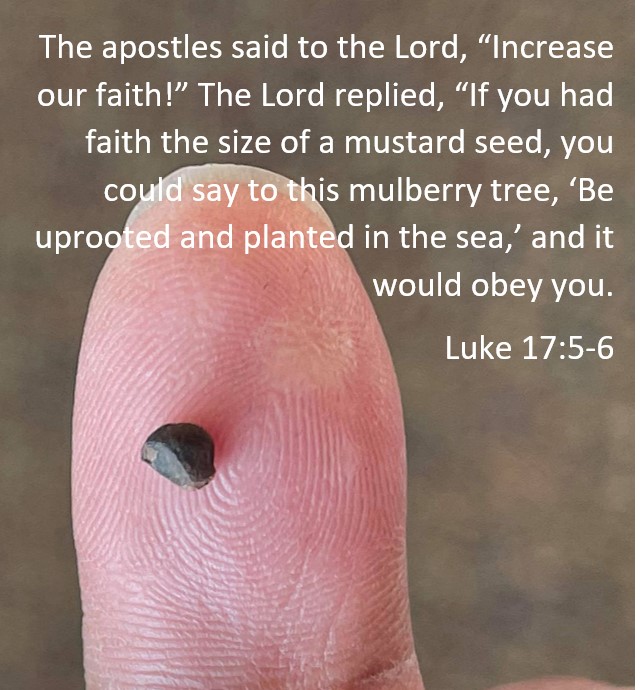
1st Sunday of Lent – Year C – March 6, 2022
LENT: A SEASON TO TALK
On Wednesday we began the liturgical season of Lent, during which the Church invites us to prepare ourselves to celebrate the great feast of Easter and examine ourselves to learn about our shortcomings and failures as we received ashes on our foreheads. This is a special time for recalling the gift of our baptism, when we became children of God. What does it mean to be children of God? The answer to it I would say is to become “Lent”. What does “Lent” mean or to become “Lent”.
I believe “Lent” means:
Lowering ourselves before that Lord from our pride, judgemental attitude, and discriminatory viewpoints of other. The Church invites us to renew the gift she has given us, not to let this gift lie dormant as if it were something from the past or locked away in a “memory chest”. God’s dream makes its home and lives in each one of us so that at every Easter, in every Eucharist we celebrate, we may be the children of God. It is a dream which so many of our brothers and sisters have had through history. A dream witnessed to by the blood of so many martyrs, both from long ago and from now.
Entering the deepest darkness of our lives and examining ourselves to see if we have forgotten our first love for Jesus or become lukewarm in our relationship with him. Lent is a good time to recover the joy and hope that make us feel like beloved sons and daughters of the Father. The Father who waits for us to cast off our garments of exhaustion, of apathy, of mistrust, and clothe us with the dignity which only a true father or mother knows how to give their children, with the garments born of tenderness and love. Our Father, He is the Father of a great family; he is our Father. He knows that he has a unique love, but he does not know how to bear or raise an “only child”. He is the God of the home, of brotherhood, of bread broken and shared. He is the God who is “Our Father”, not “my father” or “your stepfather”.
Nothing should take us away from the Lord neither our doubts rising from our pain and suffering nor the temptations and distraction of the world. As St. Paul says “Who will separate us from the love of Christ? Will hardship, or distress, or persecution, or famine, or nakedness, or peril, or sword? As it is written, “For your sake we are being killed all day long; we are accounted as sheep to be slaughtered.” No, in all these things we are more than conquerors through him who loved us. For I am convinced that neither death, nor life, nor angels, nor rulers, nor things present, nor things to come, nor powers, nor height, nor depth, nor anything else in all creation, will be able to separate us from the love of God in Christ Jesus our Lord” (Romans 35-39).
Talking with the Lord during this season of Lent is very important because talking will bring us to trust in him and trust will lead us to tear our hearts in repentance for our failures, short comings, and sins. The Prophet Joel beautifully highlights the importance of fasting and our attitude towards God and other people “Yet even now, says the Lord, return to me with all your heart, with fasting, with weeping, and with mourning; rend your hearts and not your clothing. Return to the Lord, your God, for he is gracious and merciful, slow to anger, and abounding in steadfast love, and relents from punishing. Who knows whether he will not turn and relent, and leave a blessing behind him, a grain offering and a drink offering for the Lord, your God? Blow the trumpet in Zion; sanctify a fast; call a solemn assembly; gather the people. Sanctify the congregation; assemble the aged; gather the children, even infants at the breast. Let the bridegroom leave his room, and the bride her canopy. Between the vestibule and the altar let the priests, the ministers of the Lord, weep.
Let them say, “Spare your people, O Lord, and do not make your heritage a mockery, a byword among the nations. Why should it be said among the peoples, ‘Where is their God?’” Then the Lord became jealous for his land and had pity on his people” (2:12-18).
I came across to this funny story, but I felt this has very deep message for us to learn and understand that we have no identity without Jesus and we maybe led by the devil to be his.
There was a large group of people gathered. On one side of the group stood a man, Jesus. On the other side stood another, Satan. Separating them was a fence running through the group. The scene set, both Jesus and Satan began calling to people in the group. One by one, each having made up his or her own mind, went to either Jesus or Satan. This kept going for a time. Soon enough, Jesus had gathered around him a group of people from the larger crowd, as did Satan. One man joined neither group. He climbed the fence that was there and sat on it. Jesus and his people left and disappeared, and so too did Satan and his people. The man on the fence sat alone. As this man sat, Satan came back, looking for something which he appeared to have lost. The man said, “Have you lost something?” Satan looked straight at him and replied, “No, there you are. Come with me.” The man said, “But I sat on the fence. I chose neither you nor him.” Satan said, “That’s okay; I own the fence.” Whom do we belong? With whom do we like to talk during this season of Lent?
Moses in the First Reading today along with Israelites is teaching us a lesson to learn to talk to God and Jesus. There are three very important elements for us to understand what Moses is talking about.
First, we must offer the Lord not only our blessings but also our lives and sit before the Lord to talk and acknowledge our sinfulness as King David did (please read Psalm 51). Whenever we accept our weaknesses, the more strength and power we get to overcome the temptations and distractions of the world and Jesus becomes the center of our lives.
Secondly, we must believe in the mercy of God during times of our trials and tribulations and never to complain to God that my problem is too big but let our problems know that our God is greater. Moses is reminding everyone to believe in the mercy, protection and compassion of God who has the power to protect and save us from our temptations and distraction. St. Paul says “No testing has overtaken you that is not common to everyone. God is faithful, and he will not let you be tested beyond your strength, but with the testing he will also provide the way out so that you may be able to endure it” (1 Corinthians 10:13).
Thirdly, we must allow the Lord to work in our lives and walk with him and obey him. Sometimes we are tempted by the secular world to believe that we don’t need God and we can do everything by ourselves. However, St. Paul says “we store this treasure in the clay pots so that it may be made clear that it is not our capability but the power of God who has called us to serve him”.
The following story will help us to understand the third point that Moses is reminding people to sit and bow before the Lord.
The devil appeared to three monks and said to them: “if I give you power to change something from the past, what would you change?”
The first monk, with great apostolic fervor, replied: “I would prevent you from making Adam and Eve fall into sin so that humanity could not turn away from God.”
The second monk, a man full of mercy, said to him: “I would prevent you from God and you will condemn yourself eternally.”
The third of them was the simplest and, instead of responding to the tempter, he got on his knees, made the sign of the cross and prayed saying: “Lord, free me from the temptation of what could be and was not.”
The devil, giving a raucous cry and shuddering with pain, vanished.
The other two, surprised, said to him: “Brother, why have you responded like this?”
He (3rd monk) replied, “First, we must NEVER dialogue with the devil. Second, NOBODY in the world has the power to change the past. Third, Satan’s INTEREST/INTENT was not to prove our virtue, but to trap us in the past, so that we neglect the present, which is the only time God gives us His grace and we can cooperate with Him to fulfill His will.”
Of all the demons, the one that catches the most men and women and prevents them from being happy is that of “what could have been and was not.”
Lent is a time of conversion, of daily experiencing in our lives to follow the above three points. “Lent is a time for reconsidering our feelings, for letting our eyes be opened to the frequent injustices which stand in direct opposition to the dream and the plan of God. It is a time to unmask three great temptations that wear down and fracture the image which God wanted to form in us: There are three temptations of Christ… three temptations for the Christian, which seek to destroy what we have been called to be; three temptations which try to corrode us and tear us down” as quoted by Pope Francis.
On the first Sunday of Lent, we are introduced to the very interesting Gospel reading where devil is shown playing with the human side of Jesus. He tries to trap Jesus in a very clever way however Jesus shows His trust in His Father. In each of the three Synoptic Gospels, after his baptism, Jesus is reported to have spent forty days in the desert, fasting and praying. In Luke and in Matthew, the devil presents three temptations to Jesus. The devil tempts Jesus to use his power to appease his hunger, he offers Jesus all the kingdoms of the world if Jesus will worship him, and he tempts Jesus to put God’s promise of protection to the test. In each case, Jesus resists, citing words from Scripture to rebuke the devil’s temptation. Through these temptations devil shows his cleverness to play with the Scripture. These three temptations are deeply rooted into our human desires of greed, pride and power.
First, wealth: seizing hold of goods destined for all, and using them only for “my own people”. That is, taking “bread” based on the toil of others, or even at the expense of their very lives. That wealth which tastes of pain, bitterness, and suffering. That is the bread that a corrupt family or society gives its own children. St. James bluntly speaks in his letter and warn the rich to be careful if they don’t care about others.
The second temptation, vanity: the pursuit of prestige based on continuous, relentless exclusion of those who “are not like me”. The futile chasing of those five minutes of fame which do not forgive the “reputation” of others. “Making firewood from a felled tree” gradually gives way to the third temptation, the worst. It is that of pride, or rather, putting oneself on a higher level than one truly is on, feeling that one does not share the life of “mere mortals”, and yet being one who prays every day: “I thank you Lord that you have not made me like those others…”.
The three temptations of Christ, which the Christian are facing daily. Three temptations which seek to disintegrate, destroy, and extinguish the joy and freshness of the Gospel. Three temptations which lock us into a cycle of destruction and sin. It is worth asking ourselves: To what degree are we aware of these temptations in our lives, in our very selves? How much have we become accustomed to a lifestyle where we think that our source and life force lies only in wealth? To what point do we feel that caring about others, our concern and work for bread, for the good name and dignity of others, are wellsprings of happiness and hope?
We have chosen Jesus, not the evil one. If we remember what we heard in the Gospel, Jesus does not reply to the devil with any of his own words, but rather he uses the words of God, the words of scripture. We know what it means to be seduced by money, fame, and power. For this reason, the Church gives us the gift of this Lenten season, invites us to conversion, offering but one certainty: he is waiting for us and wants to heal our hearts of all that tears us down. He is the God who has a name: Mercy. His name is our wealth, his name is what makes us famous, his name is our power, and, in his name, we say once more with the Psalm: “You are my God and in you I trust”. Will you repeat it together? Three times: “You are my God and in you I trust”. “You are my God and in you I trust”.
Let’s talk to him during this season of Lent because he listens.
Other Sermons In This Series

15th Sunday in Ordinary Time Year C ~ July 10, 2022
July 07, 2022

27th Sunday in Ordinary Time Year C – October 2, 2022
September 29, 2022

32ND SUNDAY IN ORDINARY TIME YEAR B ~ November 10, 2024
November 07, 2024

